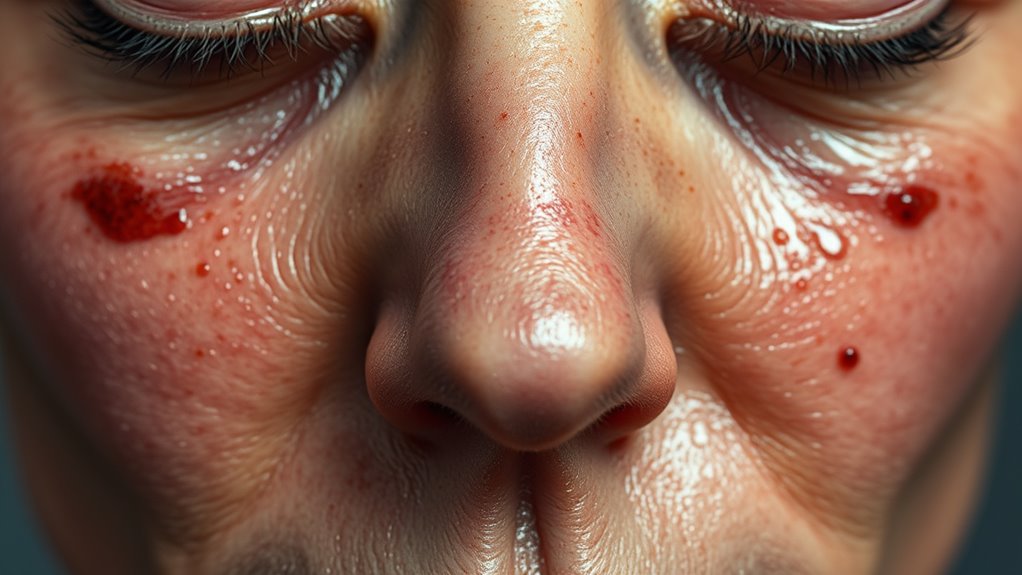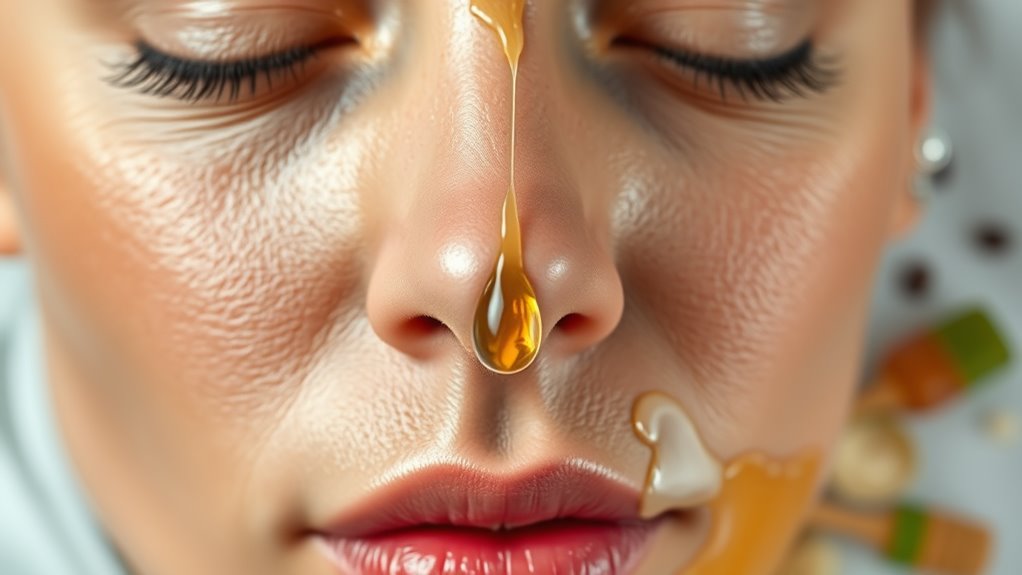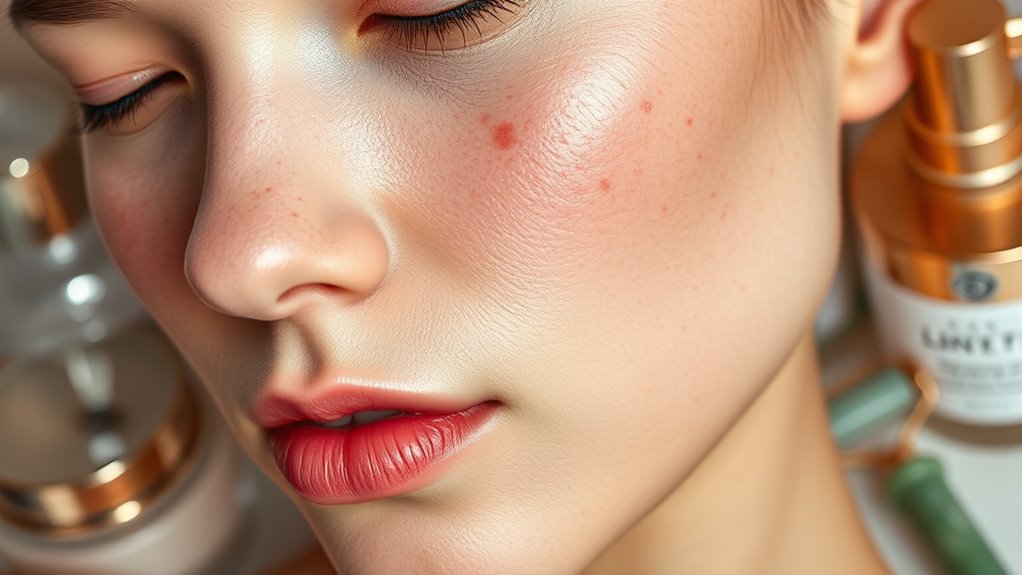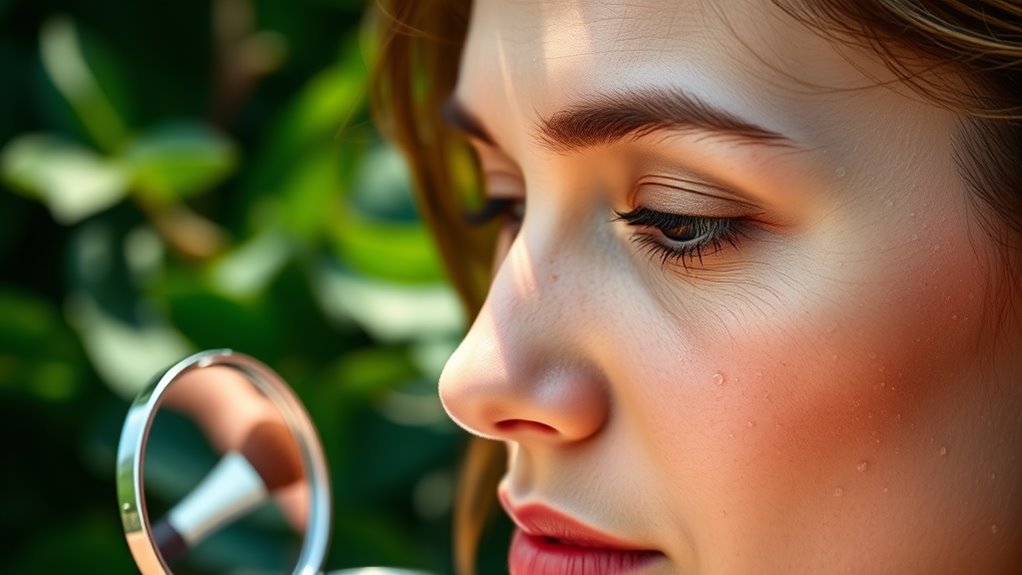This Is What Happens When You Don’t Moisturize Oily Skin – It’s Not What You Think
When you skip moisturizer for oily skin, you might actually trigger more oil production. Contrary to popular belief, lacking hydration can lead your skin to overcompensate, resulting in greasiness and clogged pores. This cycle can cause breakouts and leave your complexion looking dull. Even oily skin needs water to stay balanced and healthy. Discover how to choose the right moisturizer and maintain a routine that supports your skin’s needs.
Key Takeaways
- Skipping moisturizer can lead to increased oil production as the skin compensates for lack of hydration.
- Oily skin can still be dehydrated, leading to dullness and an unhealthy appearance.
- Clogged pores from excess oil may result in frequent breakouts and acne flare-ups.
- Non-comedogenic moisturizers can help balance oil levels and prevent skin issues.
- Neglecting to moisturize can accelerate signs of aging, like fine lines and wrinkles.
The Myth of No Moisturizer for Oily Skin
Many people believe that if you have oily skin, you should skip moisturizer altogether, but this myth can actually lead to more skin issues. When you don’t moisturize, your skin may produce even more oil to compensate for the lack of hydration.
Instead, follow these oily skin moisturizing tips: opt for lightweight, non-comedogenic moisturizers that hydrate without clogging pores. Look for ingredients like hyaluronic acid and glycerin, which help retain moisture while keeping oiliness in check. Keeping oiliness in check is essential for preventing breakouts and maintaining a clear complexion.
Apply your moisturizer after cleansing, and consider using a gel-based product for a refreshing feel. Remember, maintaining balanced hydration is crucial for overall skin health, so don’t neglect this essential step in your skincare routine.
Embrace the right moisturizer for optimal results.
Understanding Oily Skin and Its Needs
To effectively care for oily skin, it’s important to first understand its unique characteristics and requirements. Oily skin results from overactive sebaceous glands producing excess sebum, which can lead to enlarged pores and acne.
This skin type often feels greasy, especially in the T-zone, and may experience frequent breakouts. However, oily skin also benefits from its natural moisture barrier, which can help slow down the aging process. To maintain balance, you need lightweight, non-comedogenic products that won’t clog your pores. Ingredients like salicylic acid and niacinamide can help regulate oil production and minimize pores. Additionally, incorporating simple solutions for managing oily skin can provide effective relief and improve your skin’s overall appearance.
How Skipping Moisturizer Affects Your Skin
When you skip moisturizer, your skin may respond by producing even more oil to compensate for the lack of hydration. This can lead to a cycle of increased oiliness, leaving your complexion looking dull and dehydrated. Ultimately, neglecting moisturizer can undermine your efforts to maintain healthy, balanced skin. Additionally, without proper hydration, your skin’s protective barrier may weaken, making it more susceptible to environmental stressors and irritation.
Increased Oil Production
Skipping moisturizer can paradoxically lead to increased oil production in your skin. When you forgo hydration, your skin senses a lack of moisture and compensates by producing more oil.
This response is primarily driven by the sebaceous glands, which ramp up oil secretion to prevent dehydration. As a result, you may experience a cycle of excess oiliness, leading to clogged pores and potential breakouts.
Scientific studies indicate that maintaining adequate hydration helps balance sebum production, even in oily skin types. By incorporating a lightweight, oil-free moisturizer into your routine, you can effectively signal your skin to moderate oil production, promoting a healthier complexion.
Dull and Dehydrated Skin
Neglecting to use a moisturizer can leave your skin looking dull and dehydrated, even if you have an oily complexion.
Your skin’s outer layer, the stratum corneum, relies on hydration to maintain its barrier function and radiance. When you skip moisturizer, the skin can become compromised, leading to a lackluster appearance.
Dehydrated skin often produces more oil as a compensatory mechanism, exacerbating both dullness and shine.
Studies show that incorporating a lightweight, non-comedogenic moisturizer helps maintain optimal hydration levels, enhancing skin texture and glow.
This balance is crucial; without moisture, your skin can lose its natural luminosity, making it appear tired and lifeless.
Prioritizing moisturizer is essential, even for oily skin types, to achieve that vibrant, healthy look you desire.
The Role of Hydration in Oily Skin Care
Hydration plays a crucial role in managing oily skin, often contradicting common misconceptions that oily skin doesn’t need moisture.
In reality, when your skin is dehydrated, it can produce even more oil to compensate, leading to a cycle of excess oiliness. Maintaining proper hydration is essential to prevent this imbalance and achieve a balanced and healthier complexion.
Understanding the importance of proper hydration can help you achieve a balanced and healthier complexion.
Importance of Hydration
Although many people with oily skin might assume they don’t need to moisturize, maintaining proper hydration is essential for balanced skin health.
Hydration helps regulate oil production; when your skin is adequately hydrated, it’s less likely to overcompensate by producing excess sebum.
Additionally, hydrated skin can strengthen the skin barrier, preventing issues like acne and irritation.
Incorporating lightweight, non-comedogenic moisturizers can provide the necessary moisture without clogging pores.
Ingredients like hyaluronic acid and glycerin attract water to the skin, enhancing elasticity and overall appearance.
Remember, hydration isn’t just about oil control; it’s about achieving a balanced complexion.
Misconceptions About Oily Skin
Many people mistakenly believe that oily skin doesn’t require moisturizer, leading to the harmful assumption that hydration is unnecessary. In reality, even oily skin requires moisture to maintain balance and prevent overproduction of oil. Here’s a breakdown of common misconceptions:
| Misconception | Truth |
|---|---|
| Oily skin doesn’t need moisture | Oily skin still needs hydration |
| Moisturizers cause breakouts | Non-comedogenic moisturizers can help |
| Oily skin is always hydrated | Oily skin can be dehydrated and lack water |
| Skipping moisturizer reduces oil | It can lead to increased oil production |
Common Misconceptions About Oily Skin
Oily skin often comes with a host of misconceptions that can lead to ineffective skincare routines.
One common myth is that oily skin doesn’t need moisturizer, which can actually exacerbate oiliness and lead to dryness. Additionally, failing to moisturize can result in increased oil production, as the skin compensates for the lack of moisture.
Another misconception is that oily skin is solely caused by genetics; while genetics play a role, factors like diet, stress, and hormonal changes also contribute significantly.
Many believe that harsh cleansers are the solution, but these can strip the skin, triggering more oil production.
Lastly, some think that oily skin is always acne-prone, overlooking the reality that not everyone with oily skin experiences breakouts.
Understanding these misconceptions allows you to adopt a more effective approach to your skincare routine.
Signs Your Oily Skin Is Dehydrated
Misunderstanding the needs of oily skin can lead to a surprising issue: dehydration. Many people with oily skin overlook hydration, thinking their skin is already oily enough. However, dehydration can manifest in several ways, and recognizing these signs is crucial for maintaining skin health.
-
You notice flakiness or rough patches despite an oily surface.
-
Your skin feels tight or uncomfortable, especially after cleansing.
-
You experience increased oil production as your skin compensates for the lack of moisture.
These symptoms indicate that your skin isn’t adequately hydrated, which can exacerbate oiliness and lead to other issues.
Addressing dehydration is essential; it helps balance your skin and supports overall health. Understanding these signs empowers you to take better care of your skin.
Choosing the Right Moisturizer for Oily Skin
When selecting a moisturizer for your skin, it’s essential to prioritize lightweight, non-comedogenic options that hydrate without adding excess oil.
Look for products labeled as oil-free or gel-based, as they tend to absorb quickly and won’t clog your pores. Ingredients like hyaluronic acid and glycerin are excellent choices; they provide hydration while maintaining your skin’s balance.
Avoid heavy creams or those containing mineral oils, as these can exacerbate oiliness. Additionally, consider moisturizers with added benefits, such as salicylic acid, which can help manage breakouts.
Remember to patch-test new products to ensure compatibility with your skin. By choosing the right moisturizer, you can achieve a well-hydrated complexion that doesn’t compromise your skin’s natural oil levels.
Natural Ingredients That Benefit Oily Skin
Finding the right moisturizer is just one part of managing oily skin; incorporating natural ingredients can significantly enhance your skincare routine.
These ingredients not only help control excess oil but also nourish your skin without clogging pores. Here are three natural options to consider:
-
Tea Tree Oil: Known for its antibacterial properties, it helps reduce acne and inflammation.
-
Aloe Vera: This soothing gel provides hydration without added oiliness, calming irritated skin.
-
Witch Hazel: A natural astringent, it tightens pores and reduces excess oil production.
Integrating these ingredients into your regimen can lead to a balanced complexion, promoting healthy, radiant skin.
Always patch test new products to ensure compatibility with your skin type.
Daily Moisturizing Routine for Oily Skin
Maintaining proper hydration is crucial for your oily skin, as it helps balance oil production and prevent breakouts.
Choosing the right products, specifically lightweight, non-comedogenic moisturizers, can enhance your skin’s hydration without adding excess oil.
Establishing a daily moisturizing routine tailored to your skin type will support a healthier complexion.
Importance of Hydration
Hydration is essential for achieving a balanced complexion, even for those with oily skin. When you neglect moisturizing, your skin can overcompensate by producing even more oil, leading to breakouts and an uneven texture.
A daily moisturizing routine helps maintain your skin’s moisture barrier and prevents excessive oiliness.
- It regulates oil production, keeping your skin in balance.
- Well-hydrated skin appears plumper and healthier.
- Moisturizing can enhance the effectiveness of your other skincare products.
Incorporating a lightweight, oil-free moisturizer into your regimen ensures that your skin stays hydrated without feeling greasy.
Choosing the Right Products
When selecting products for your daily moisturizing routine, it’s crucial to focus on formulations specifically designed for oily skin.
Look for lightweight, oil-free moisturizers containing ingredients like hyaluronic acid, glycerin, and salicylic acid. These components hydrate without clogging pores or exacerbating oiliness.
Gel-based formulas are ideal, as they absorb quickly and provide a matte finish. Additionally, consider products with non-comedogenic labels to ensure they won’t lead to breakouts.
Incorporating a moisturizer with SPF can also protect your skin from UV damage.
Remember, consistency is key; applying your moisturizer daily will help maintain your skin’s balance.
Long-Term Effects of Neglecting Moisturization
Neglecting moisturization can lead to a cascade of long-term effects on oily skin that may surprise you. While you might think skipping moisturizer helps control oil, the opposite can occur.
Without adequate hydration, your skin may overcompensate by producing even more oil, resulting in persistent shine and clogged pores. Furthermore, chronic dehydration can lead to premature aging signs, including fine lines and wrinkles.
- Increased oiliness as your skin tries to compensate
- Heightened risk of acne due to clogged pores
- Accelerated aging, with fine lines appearing sooner
To maintain a balanced, healthy complexion, prioritizing moisturization is essential, even if you have oily skin. Don’t underestimate the power of hydration in your skincare routine.




